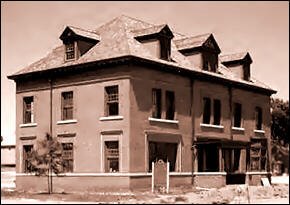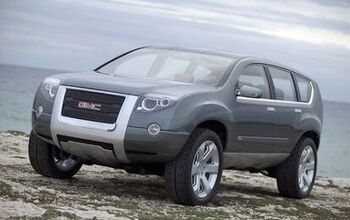General Motors Death Watch 72: Circumspice
Growing up near Flint, everyone's dad worked for GM. Not all of our fathers brought home a GM paycheck, but we all lived on GM money. If your dad was a plumber, a shopkeeper or a mortgage broker, GM's wages paid the bills. If your dad was a dentist, GM's health plan paid his patients' bills. That's just how it was. GM was one of your parents, the UAW was the other. We had no idea we were destined to become orphans.
My dad taught shop at Flint Central High School. Since everyone's dad worked for GM, everyone took shop. It was the ideal time and place for teaching drafting, auto repair, woodworking, metallurgy, welding and other productive skills. People believed in those fields. People respected those talents. In the beginning, his classroom was a shrine to hard work and craftsmanship. His students knew they were opening the door to a comfortable life. By the time Dad retired in 1991 the promise had become an empty shell. The excitement and the discipline had simply drained away.
The GM era officially ended for my family in 1980. That was the year Dad brought home a new Volkswagen diesel, even though all his previous cars had been Detroit steel. Buying a Rabbit was the kind of radical move that could get you branded a traitor in Flint. Even so, it was a car town. People were intrigued by the German import. Their interest was a sign of things to come. You still find more American autos on the road in Michigan than you do in most other states, but their supremacy has faded even here.
Over the years, going into downtown Flint became vaguely sinister, like entering a foreign country. Despite what you might think, it's easy to ignore news reports proclaiming your hometown one of the most dangerous places in America. Eventually, though, the decay becomes so obvious that you can't deny it. And then you start noticing people's reaction when you tell them you grew up around Flint. They wince or grimace, and tell you they haven't been there in years. They're not surprised that you don't live there anymore.
Flint's emigrants took something with them: hope. Can you imagine what it's like for a guy to come off the assembly line after 15 years at $20 an hour and generous health care benefits, only to be told that his skills are useless and that he'll have to retrain for a $12 job? That the $12 job might not even be there? That he might have to leave behind the life he's always known and look for a job, any job, any place he can find it? Multiply that by thousands. It's as if someone repossessed our future, packed it up in the middle of the night, and left. As Bruce Springsteen wrote, "these jobs are going, boys, and they ain't comin' back."
And now GM may go bankrupt. Whether or not GM dodges that bullet, the damage is done. Forget about off-shoring. More jobs are lost to technology and automation than to cheap Chinese and Indian labor. The new plants build twice as many cars with half as many workers, and no protectionist scheme can change that. Even assembly line vets are beginning to accept that the unions can't keep the ship afloat with all hands on deck, and there's no way our collective strength can turn back the clock. It's every man, every family, for themselves.
With the number of victims growing daily, some still refuse to acknowledge the possibility that it's over. To allow that heresy to creep into their collective conscience is just too painful. GM was the rock our lives were built upon. It's too big to crumble, too hard to crack, too important to fail. It's impossible, isn't it? In fact, Flint has a front row seat to the shredding of America's socio-economic fabric. We're watching the working class culture that's lasted more than 100 years get violently upended, with little idea what – or who – can replace it. If we didn't have the leadership to salvage what we already had, where will we find the leadership to start again from scratch?
I remember Phil Donahue coming to Flint in 1990 to discuss the lay-offs and associated hardships documented by Michael Moore's "Roger and Me." Folks recognized that Flint was in a tough spot. They reacted to the film and the resulting attention with a mixture of anger, embarrassment and wounded pride. That was a long time ago now. Things are worse today than they were then. The anger's been replaced by resignation. GM, Ford, Electrolux, Steelcase– Michigan is supposed to be about making things. If GM does go down, you may as well rename the whole state, because it won't be Michigan anymore.
More by Bryan Myrkle
Latest Car Reviews
Read moreLatest Product Reviews
Read moreRecent Comments
- Ajla So a $10K+ transmission repair?
- Kwik_Shift_Pro4X I've mentioned before about being very underwhelmed by the Hornet for a $50000+ all in price tag. Just wasn't for me. I'd prefer a Mazda CX-5 or even a Rogue.
- MaintenanceCosts Other sources seem to think that the "electric Highlander" will be built on TNGA and that the other 3-row will be on an all-new EV-specific platform. In that case, why bother building the first one at all?
- THX1136 Two thoughts as I read through the article. 1) I really like the fins on this compared to the others. For me this is a jet while the others were propeller driven craft in appearance.2) The mention of the wider whitewalls brought to mind a vague memory. After the wider version fell out of favor I seem to remember that one could buy add-on wide whitewalls only that fit on top of the tire so the older look could be maintained. I remember they would look relatively okay until the add-on would start to ripple and bow out indicating their exact nature. Thanks for the write up, Corey. Looking forward to what's next.
- Analoggrotto It's bad enough we have to read your endless Hyundai Kia Genesis shilling, we don't want to hear actually it too. We spend good money on speakers, headphones and amplifiers!


































Comments
Join the conversation